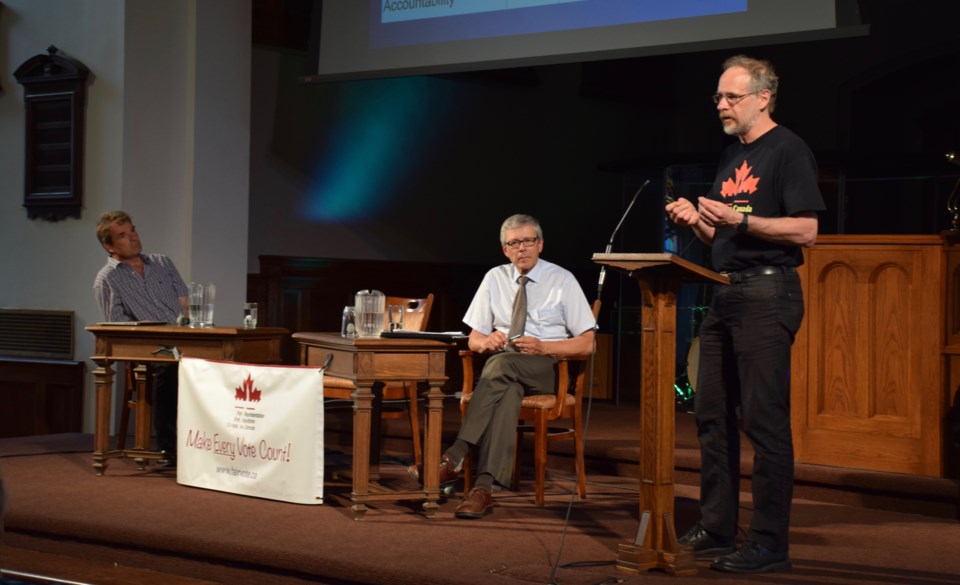There are alternatives to the first-past-the-post voting system that Canada has been locked into for over a century. Fair Vote Canada is nudging the local electorate to consider those options more carefully, now that a parliamentary committee has been struck to reform the way Canada does elections. That committee will be seeking input from Canadians.
About 65 people turned out to Hope House on Cork Street Tuesday night for Vote for Canada, a town hall on electoral reform hosted by Fair Vote Canada’s Guelph chapter.
Some form of proportional representation - there are a few - was promoted as a fairer, more collaborative system, and one that is more reflective of Canadian reality.
Steve Dyck of Fair Vote Canada, and University of Waterloo professor Byron Weber Becker, explored the current first-past-the-post system, comparing it to two forms of proportional representation, and a system known as alternative vote, or single transferable vote.
On all counts, proportional representation – a system used by the vast majority of the world’s 50 developed countries – won out over the existing, entrenched system, according to Dyck and Weber Becker.
Six democratic criteria were used in the comparison – fair representation, reflection of Canada, voter equality, local representation, good governance, and accountability. Dyck said on most of those indicators, first-past-the-post falls short.
If Canadians want a voting system in which every vote counts, and one where taking the time to vote has a meaningful contribution to good government, then first-past-the-post is clearly not the way forward, he indicated. The winner/loser mentality of the current system doesn’t give adequate representation to all political perspectives.
In a diverse and inclusive country, Dyck said, it’s important to have diversity encouraged in the voting system, and represented in government. Too many Canadians decide not to vote because they feel their vote doesn’t matter to the outcome.
First-past-the-post is not fair, Dyck said, in that the number of seats won is rarely a reflection of the number of votes received. In the 2015 federal election, the Liberals won 54 per cent of the seats on just 40 per cent of the vote, making the win a so-called false majority, Dyck said.
False majorities are common. In the 1987 New Brunswick election, the Liberals won all 58 seats on 60 per cent of the vote.
Dyck said one of the costliest and most disruptive characteristics of first-past-the-post is what is called “policy lurch.” When new governments come in they create new policies and programs that are often dissolved when an opposition government takes power. It creates an atmosphere of instability.
Weber Becker said proportional representation systems tend to involve larger ridings and more candidates. There are various balloting approaches, but essentially voters get two votes. The first ballot is like a first-past-the-post format, where the candidate with the most votes win. The second is for at-large party candidates that serve the region as a whole. Those seats are distributed according to the percentage of the popular vote received. All parties would generally be represented in the riding.
“All proportional representation systems are better than what we have now,” Weber Becker said.
The parliamentary committee will be inviting members of Parliament to conduct electoral reform forums in their ridings, and to file reports by Oct. 1. A national engagement process is also being planned.
Canadians need to become aware of the options and let their voices be heard, says Fair Vote Canada.
